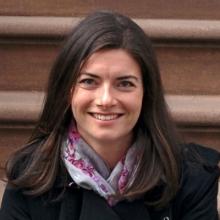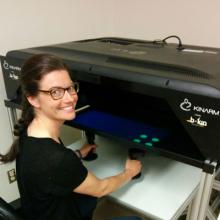Bev Larssen
Beverly Larssen was a semi-finalist in the 2021 Three Minute Thesis competition, with her presentation, "Re-learning to reach after stroke."
Why did you decide to pursue a graduate degree?
After completing my MSc in 2013, I wanted to apply my background in optimizing motor learning to a clinical context. More specifically, I was interested in studying how motor learning principles are applied to physical therapy interventions targeting the rehabilitation of upper-extremity functions in adults after they have had a stroke. Through the MPT/PhD program at UBC, I have the unique opportunity to be exposed to what stroke rehabilitation looks like clinically and apply these concepts to inform the development of my research program.
Why did you decide to study at UBC?
The Department of Physical Therapy is home to leading researchers in the field of stroke rehabilitation, including my PhD supervisor Dr. Lara Boyd. Having the support of such a strong network of researchers and clinician-scientists in my field will serve me well during my graduate studies.
What is it specifically, that your program offers, that attracted you?
UBC is one of only a few Canadian universities that offer a combined MPT/PhD program. This program provides me with clinical training and experience that will help me approach my research from a clinical perspective.
What was the best surprise about UBC or life in Vancouver?
The UBC Vancouver campus is always evolving and there is no shortage of places to explore. Even after being on campus for many years, taking a break to run through the trails of Pacific Spirit Park never gets old.
What aspects of your life or career before now have best prepared you for your UBC graduate program?
My previous research and teaching experience in the UBC School of Kinesiology made for an easy transition to further graduate studies in the Department of Physical Therapy. Having time management skills and enjoying the work I do has been an asset. Through my previous experience working in a research field that inspires my curiosity, while volunteering in the community as a track and field coach and participating in community science outreach programs, I’ve developed effective time management skills that work for me so that I can stay engaged in all of the professional and personal activities that I enjoy.
What advice do you have for new graduate students?
Don’t forget to take time for yourself to re-energize and maintain a healthy work-life balance. Whether that is playing outside or getting involved in an extra-curricular activity that you enjoy, Vancouver has a lot to offer.

